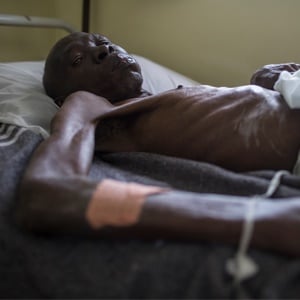
Summary
- HIV wasting syndrome is the progressive and unintended loss of more than 10 percent of body weight in 12 months.
- It is common among people with HIV.
- Wasting may be accompanied by diarrhoea, fever, nutritional deficiencies and weakness.
- It has a wide variety of causes, and treatment is also varied.
- It is a frequent cause of death among people with AIDS.
Alternative names
Cachexia
Acute malnutrition
What is HIV wasting syndrome?
HIV wasting syndrome, the progressive and unintended loss of more than 10 percent of body weight in 12 months (or more than 5% of body weight in 6 months), is very common among HIV-positive people. Body fat and especially lean body mass are lost, leaving the patient weak and vulnerable to illness.
Most patients with advanced HIV disease and AIDS experience some wasting, even if on anti-HIV medication.
Wasting can happen rapidly, especially during particular opportunistic infections such as mycobacterium avium complex (MAC), tuberculosis , or pneumocystis pneumonia (PCP) . More gradual wasting can also occur, sometimes due to the HI virus itself. Wasting may be accompanied by diarrhoea, fever, nutritional deficiencies and weakness.
What causes HIV wasting syndrome?
HIV wasting syndrome has many contributing causes. The patient may simply not be taking in sufficient calories, due to factors including:
- loss of appetite or nausea (often a medication side effect)
- a diet that does not contain sufficient protein or micronutrients
- depression
- economic difficulties
- altered sense of taste
- dietary restrictions (such as those related to certain HIV medications)
- ulcers of the mouth or oesophagus
Even if they are getting enough calories, many people with HIV lose nutrients anyway, due to:
- Diarrhoea and vomiting (a common drug side effect).
- Malabsorption of nutrients by the intestines, due to the HI virus or intestinal infections.
- Increased energy demands due to HIV. The body may use up protein, instead of fat, to generate energy - causing elevated glucose and fat levels in the blood, and muscle loss. The body also needs protein to repair tissue and replace immune-system cells that have been lost fighting disease.
- Increased demand for energy and micronutrients by organs such as the liver and kidneys, which need to process HIV medications.
- Abnormalities in metabolising food.
- HIV-related infections, such as cryptosporidiosis and microsporidiosis , which can cause diarrhoea and impair nutrient absorption in the gut. Cytomegalovirus, lymphoma , and Kaposi's sarcoma can also impede absorption.
- Cytokines, substances that are produced by cells as part of the immune response. Certain cytokines (such as tumour necrosis factor a ) are directly responsible for mobilising energy from muscle stores to fight infections.
- Cytokines may also cause symptoms such as nausea, decreased appetite, fatigue and diarrhoea .
- Hormonal problems such as decreased production of testosterone and insulin-like growth factor, which help turn protein into muscle. Low testosterone levels have also been linked to fatigue, depression, and weight and muscle loss.
What are the symptoms of HIV wasting syndrome?
- weight loss
- loss of fat and muscle mass
- diarrhoea
- fever
- d epression
- poor appetite
- weakness
How is a diagnosis made?
Wasting syndrome can be diagnosed if someone who is HIV -positive has lost more than ten percent of their body weight. This can be assessed by bioelectrical impedance analysis (BIA), which measures the lean and fat composition of the body. Lean body mass can also be measured with a DEXA scan.
- Tests for opportunistic infections such as MAC or TB.
- Tests can detect specific problems that make eating difficult, such as oral thrush .
- A doctor can assess whether anti-HIV medication might be affecting the patient's appetite.
- The patient can be assessed for depression.
- A stool sample or endoscopy might be required to detect intestinal infections.
- Blood tests can test for low testosterone or infection.
How is it treated?
There is much debate about the best way to treat wasting, especially muscle loss. The aim of treatment is to increase both body weight and lean body mass (muscle).
Diet is important for everybody with HIV, and nutritional counselling by a dietician can help the patient to gain and maintain weight. Antiretroviral therapy can control the HIV infection and slow its progress. Other treatments might include:
- oral nutritional supplements
- drugs to control nausea, vomiting and diarrhoea
- appetite-stimulating drugs
- weight training - this may not prevent wasting, but may stimulate appetite
- specific treatment for opportunistic infections
- hormone therapy and anabolic steroids
- drugs that block cytokines (such as thalidomide)
In severe forms of wasting, a feeding tube or intravenous feeding may become necessary.
What is the prognosis?
With good diet and medication, weight and muscle mass can be maintained. However, wasting remains a common cause of death among AIDS patients.
Complications
Treatments often has as a result a build-up of fat, not muscle.
Certain medications have side effects - for example, megestrol acetate can decrease testosterone production in men.
When to call your doctor
If you have HIV , are losing weight and experience weakness, fever and diarrhoea, see your doctor.
How can it be prevented?
If you are HIV-positive, it is a good idea to start a proper nutrition program even before you have any of the symptoms of wasting. Take recommended vitamin and mineral supplements.
If your testosterone levels are diagnosed as low, you should begin hormone therapy.
Antiretroviral medication can manage the underlying HIV infection, by reducing the amount of virus in the blood and delaying the progress of disease.




 Publications
Publications
 Partners
Partners















